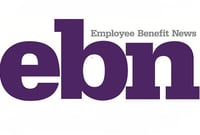 After the year we’ve had, it’s no wonder there is so much more concern about financial wellness. But while plan sponsors are well-intentioned in their efforts to help participants increase their retirement savings and other financial outcomes, the latter haven’t noticed.
After the year we’ve had, it’s no wonder there is so much more concern about financial wellness. But while plan sponsors are well-intentioned in their efforts to help participants increase their retirement savings and other financial outcomes, the latter haven’t noticed.
The TIAA-CREF Retirement Insights Survey, published in December 2020, reported that 82% of employers have upped their focus on employee health and safety, 69% have been more strongly emphasizing financial wellness for employees, and 60% have been focusing on retirement preparedness.
However, while 75% of employees recognize their employers’ increased emphasis on health and safety, only 32% of employees have taken notice of renewed attention to financial wellness, and 25% picked up on heightened focus on retirement preparedness.
And, just 23% of employees surveyed felt their employers were making a “significant effort” on financial wellness, and only 20% of employees expressed the same sentiment about retirement preparedness.
What could explain this disparity in recognition of employers’ post-pandemic initiatives? In the midst of COVID-19, all of us have been understandably bombarded with news reports about health and safety, and as a result, employees naturally take more notice of health and safety communications from employers and healthcare plan providers. Employers have likely also been sending out more messages about employee health and safety during this time.
This isn’t meant to disparage the efforts by plan sponsors to help participants improve their financial wellness and retirement outcomes. But at a time when people are naturally more attuned to notifications related to health and physical wellness, employers can still take steps to ensure their employees take more notice of their programs to strengthen wellness in their financial lives.
These actions don’t have to be in-your-face or self-serving. Plan sponsors can apply “Nudge Theory” to give participants the extra nudge they need to begin the process of consolidating their 401(k) accounts, or avoid the temptation to prematurely cash out.
Nudge Theory was introduced in the book Nudge: Improving Decisions About Health, Wealth, and Happiness by Richard Thaler and Cass Sunstein, which was published in 2008. To break it down, the approach seeks to influence the behavior of individuals and groups through interventions, but without forbidding other choices or altering economic incentives.
The authors pointed out in the book: “To count as a mere nudge, the intervention must be easy and cheap to avoid. Nudges are not mandates. Putting fruit at eye level counts as a nudge. Banning junk food does not.”
Plan sponsors can “nudge” participants to improve their financial wellness by consolidating their prior-employer 401(k) accounts into their active accounts, and not cashing out. For example, when they send out notices related to employee health and safety, sponsors can also include content along the lines of: “And while we are on the subject of health and wellness, we are also here to help you improve your financial health and wellness. Speak to us about how to roll your 401(k) savings from prior employers into your 401(k) account in our plan.”
Another message about financial wellness, included in health and safety communications, could remind employees: “Times are tough for all of us right now. But cashing out your 401(k) savings to meet emergency expenses will diminish your financial health and retirement preparedness down the line. 401(k) cash-outs should only be undertaken as an absolute last resort. Speak to us about why.”
These messages can also include attention-grabbing stats to drive these points home for plan participants, such as, “401(k) cash-outs can decrease your total retirement savings by 25%, on average, according to the Center for Retirement Research at Boston College.” Another message to influence behavior could be: “When you leave behind your 401(k) savings in your former employer’s account, the balance can lose over $2,000 from account fees over the long term—but if the balance is under $5,000, your savings could be automatically rolled over into a high-cost, low-earning investment vehicle. Speak to us about consolidating your 401(k) savings now.”
Another message for influencing participants’ behavior (in order to reduce lost and missing participants) could be: “If you’ve moved, make sure our 401(k) plan recordkeeper has your new address on file. Not keeping your address current could adversely affect your retirement readiness. Speak to us to learn more.”
These nudges can also be posted to plan sponsors’ digital announcement boards, as well as the homepages for employees on benefit portals, or plan recordkeeper websites.
When we return to offices post-pandemic, these nudges can go on regular employee announcement boards next to notices about health and safety.
It doesn’t take much to help employees take more notice of their employers’ financial wellness initiatives. Subtle nudges by sponsors can make a big difference to the retirement preparedness, and overall financial health, of their plan participants.
Spencer Williams is President and CEO of Retirement Clearinghouse, a portability solutions provider.
